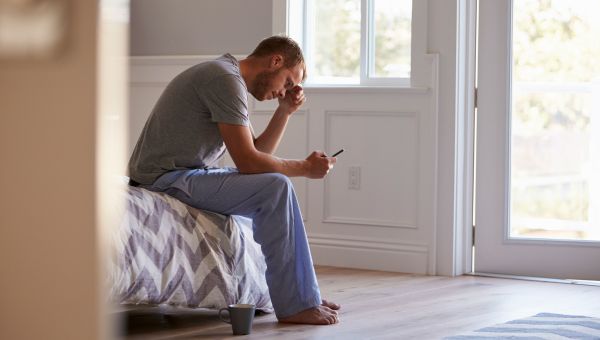7 Embarrassing Questions Men Hate to Ask (But Should)

Many men don’t feel comfortable talking about their health when problems arise. They may not want to admit a possible medical issue—aka weakness—to a spouse or partner. And guy friends tend to keep their banter to the level of last night’s game.
Still, keeping symptoms to yourself could create a bigger health problem, if left untreated. And with health concerns that aren’t life-threatening, you may deprive yourself of a solution that could improve your quality of life.
The obvious person to confide in is your healthcare provider—but many men are still hesitant to broach topics that could seem awkward or cringe-worthy. Still, there some that should be asked, no matter how embarrassing. Here are seven—and their answers.
Why am I so angry all the time?
Do you find yourself losing your temper, flying off the handle over minor issues? Have you stepped up your drinking lately? What about other dangerous behavior, like driving too fast or partying too much? If you answered yes, you could be depressed.
Depression sometimes looks different in men than it does in women. Men may experience the classic symptoms of apathy, sadness, sleep issues and fatigue, just as women do. But they’re more prone than women to atypical symptoms of anger or aggression, substance abuse and risk-seeking behavior.
Since depression is thought to mainly affect women, these other symptoms may go unrecognized. The fact is that when considering both traditional and alternative symptoms of depression, men and women meet the criteria in equal numbers.
See your healthcare provider if you experience any of these symptoms, especially if they’re out of the ordinary for you.
Why is my penis curved?
If your recent bedroom escapades have led to penis pain, check the shape. If something looks off—specifically, if your erection is curved—that could be a sign of Peyronie’s disease.
Peyronie’s disease usually stems from an injury to the penis, possibly from sex, sports or an accident. That damages blood vessels, which leads to swelling inside the penis and blocks blood flow. Then scar tissue forms, which causes the penis to curve, or bend, when it becomes erect. A sharp-enough bend can make sex painful, or even impossible.
If you’re sure you haven’t sustained an injury but your penis is still curved, the underlying cause may be an autoimmune disease. A 2015 study of more than 1,100 men suggests that men with Peyronie’s disease have a higher rate of autoimmune disease than men without the condition. Researchers think an autoimmune disease may be attacking cells in the penis, leading to the scarring that causes the penis to bend.
What’s this lump on my pec?
Women are well aware that a lump in their breast can be a first sign of cancer. But according to the American Cancer Society, about 1 in 1,000 men can also expect to have breast cancer in their lifetimes. One possible sign is a lump. Others include:
- Nipple discharge
- Skin puckering
- Redness or scaling around the nipple
Age, a family history of breast cancer, obesity and heavy alcohol use are among the risk factors for men to develop breast cancer.
Other possible changes to men’s breasts include gynecomastia, a condition in which men grow enlarged breast tissue. The excess tissue usually appears under the nipples. Low testosterone, an overactive thyroid and liver disease could be culprits, as can certain medications and drugs like anabolic steroids and marijuana.
About one in four men between the ages of 50 to 70—especially those who are overweight—develop gynecomastia due to normal hormonal changes. Stopping the medication or drug that’s causing the tissue growth usually takes care of the problem, although other causes of gynecomastia may exist, requiring treatment.
Is there anything I can do about my hair loss?
Going bald may not be dangerous to your health, but it can deal a blow to your self-confidence. Hair loss can trigger feelings of disfigurement and even depression and anxiety. It’s only natural for some men to seek ways to slow or reverse their hair loss.
Two of the most common medication treatments for hair loss are minoxidil and finasteride. Minoxidil is an over-the-counter liquid you massage into the scalp to possibly slow hair loss or regrow hair. Side effects include scalp irritation, hair growth on the face and hands and rapid heartbeat.
Finasteride is a daily pill to slow hair loss and sometimes regrow hair. Side effects include a lower sex drive, problems performing sexually and an increased risk of prostate cancer.
Surgery can also be effective, and it is sometimes used together with medication. Surgeons take sections of scalp with hair follicles, called plugs, and attach them to bald spots. Infection and scarring are possible side effects.
Why do I pee way more than I used to?
If you can’t seem to step out of the house without needing a quick pit stop to the men’s room, you’re not alone. Many men develop a condition called benign prostatic hyperplasia—also known as an enlarged prostate—as they grow older, especially after age 50. The prostate is a walnut-shaped gland near your bladder that produces one of the elements of semen.
Researchers aren’t sure why the prostate grows as men age. But when it does, it blocks urine flow, making it harder for the bladder—a muscular sac—to push urine out. That makes the bladder walls thicker so that it can’t hold as much urine, causing you to urinate more often. Symptoms of an enlarged prostate mostly revolve around urine, and can include:
- Urinating eight or more times a day
- Frequent nighttime urination
- Dribbling
- Incontinence
- Urinary hesitancy, which is trouble starting urination
- A weak urine stream
Benign prostatic hyperplasia can lead to urinary tract infections and bladder or kidney damage. Medications and surgery can shrink the prostate, but you can also make lifestyle changes such as:
- Limiting caffeine and alcohol, which can make you pee more
- Watching your fluid intake
- Exercising your pelvic floor muscles
Why can’t I lift weights the way I used to?
As you get older, you’ll need to stop trying to keep up with the young bucks on the bench press. Sarcopenia is age-related muscle loss. Most men can expect to lose between 3 and 5 or more percent of their muscle mass per decade after 30 until age 70, when muscle loss accelerates. That adds up to about 30 percent of muscle lost in a lifetime.
Sarcopenia may be caused in part by the decline in testosterone men experience as they age. You can slow your muscle loss by eating enough protein and continuing with your resistance training. Just know your limits and don’t try to set any world records.
My chest hurts; is it just a bad case of heartburn?
That would be a dangerous assumption to make. Chest pain can be a sign of a serious condition that should be checked out without delay. Seeing a healthcare provider doesn’t mean you’re a wimp—it means you care about your health.
Chest pain can be angina—a symptom of coronary heart disease. There are two types: stable angina and unstable angina. Stable angina (also called angina pectoris) feels like a pressure, squeezing pain in the chest which comes about when you’re engaged in physical activity (climbing stairs, raking leaves) or feeling strong emotions, like stress.
It happens when an artery is blocked, reducing blood flow, and lasts for a few minutes. If you experience this type of chest pain, stop what you’re doing, rest to ease the pain and see your doctor for a treatment plan.
Unstable angina is the far more serious kind which usually comes on suddenly when you’re sleeping, resting or exerting little effort. It’s a symptom of artherosclerosis—fatty build-ups in the coronary arteries, which can rupture and create clots, reducing blood flow to the heart.
When you experience sudden chest pain of this kind—you could be having a heart attack—it’s an emergency requiring immediate medical attention.
Other possible causes of chest pain—that aren’t related to heart disease—include a pulmonary embolism, inflammation of the heart (pericarditis), disease of the heart muscle, a lung infection, a panic attack or an artery tear.
Chest pain can also be caused by something minor like a pulled muscle, but it’s better to be safe than sorry. See your healthcare provider right away if your chest hurts.
Sourcing: UpToDate, National Institutes of Health, American Cancer Society, American Academy of Family Physicians, Harvard Medical School, American Heart Association, American Medical Association


